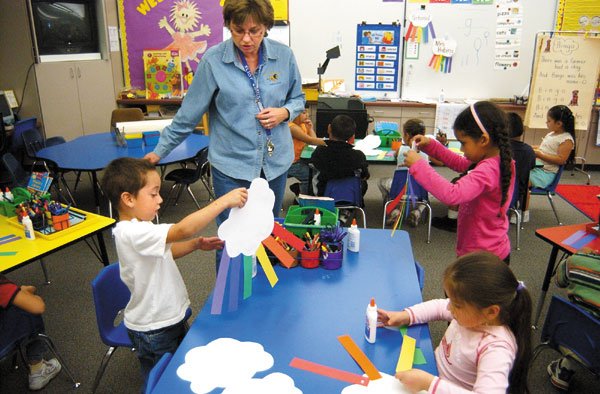Eliot Elementary School teachers face daunting challenges,
including the recent API drop, but they’re not about to back
down
Gilroy – Anyone who thinks teachers don’t take test scores to heart, should just ask Antoinette Calip how she feels about her school’s performance on recent exams.
Because if you do, her kind, blue eyes are bound to fill with tears, as they did Tuesday.
“Any of us would welcome the fix-all,” said the Eliot Elementary School third grade teacher, while wiping away tears and attempting to calm herself. “If there was a magic answer.”
Eliot has yet to find that sorcerer’s stew, a formula that will push its majority Hispanic population to the same level as the middle class student body attending Luigi Aprea Elementary School or even the diverse population of Glen View Elementary School.
That deficiency was reflected in the eastside elementary school’s recent test scores.
The 221 Latinos tested failed to meet their Academic Performance Index growth target, dropping five points from last year. Eliot now has the undesirable ranking of lowest API score among all of Gilroy’s elementary schools.
On the Adequate Yearly Progress portion, the federal assessment, the school only missed one of 17 requirements: disadvantaged students failed to meet the proficiency portion on the English language arts section.
Still, there was good news embedded in both of the results: English learners and underprivileged increased API scores by 10 and seven points, respectively. On the AYP, Hispanic and English learners met all proficiency requirements.
But as teachers and other school staffers are quick to point out, the tale behind Eliot isn’t all in those numbers.
It’s obvious, by the surrounding working class neighborhood, what kind of kids head into the two-story school everyday. And a peek at the marquee welcoming parents – filled with English and Spanish translations – provides even further insight.
But one foot on a classroom floor is where the real story lives. The vast majority of kindergartners that walked into Donna Kline’s room on the first day of school, speak little if any English.
Few of them have attended preschool or had any exposure to books, crayons or pencils.
“So we have a daunting task,” Kline said. “It’s a challenge and if we didn’t love what we were doing we’d be going to another school.
Also, the school is still living with the results of the district’s conversion to neighborhood schools, a transition that began five years ago. Since Eliot used to draw from throughout Gilroy, and now only serves students living in the surrounding area, its scores dropped when the middle class, English speaking population left.
When the neighborhood schools shift began Eliot only had about 34 English learners, but they were fluent in the language.
“So everything we do and how we do it has totally changed because we can’t assume anything,” Kline said.
Now, at least 85 percent of kindergartners enter Eliot solely speaking Spanish. And because they come from low-income backgrounds they often have no writing and reading skills in their native tongue either.
“It’s not just the language (issue),” said Principal Diane Elia. “It’s poverty and language combined.”
And a new, unforeseen challenge is always lurking around the corner.
Last year that challenge came in the form of a little boy named Jonathan, who at the age of 11 had never spent a day in a classroom. But Calip, who has taught third grade at Eliot for the past six years, welcomed him with open arms.
He didn’t speak a word of English.
“He didn’t know how to hold a pencil,” Calip said.
The educator, who speaks Spanish, took him under her wing. And she even requested that the boy remain in her class this year so she could work with him some more.
And he’s definitely progressing.
“He’s just soaking it up,” she said.
Calip also has two other third-graders who don’t speak any English. She works hard. She spends her time collaborating with co-workers, analyzing data, assessing students, trying to determine how to do it better, just like the educators at the other sites.
That’s why it’s so difficult to hear the criticism emanating from the community when their scores are less than perfect.
“It hurts, that’s the (bottom line),” Calip said.
But Calip and the rest of Eliot’s tight-knit group of teachers and administrators aren’t about to cave in. They chose to teach at the struggling school because the rewards are so sweet.
“I’ve worked with children who have an easier time learning, but I get so many more rewards working with these children,” Kline said. “I go home at the end of the day and say ‘wow.’ ”














